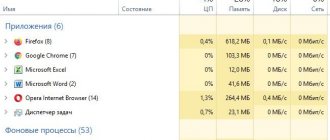Statistics show that among the variety of browsers, users most often choose Google Chrome and Yandex.Browser, and the difference in the percentage of the audience is more than 30%. It’s just that Google’s browser is installed by default on devices running the Android operating system, which gives it a certain head start.
Perhaps the comparison given in this article is not entirely correct, because Yandex created its own browser, using the proven Chrome engine as a basis. However, it is possible to come to an understanding of which browser to choose for the user only by comparing software products according to a number of criteria, including subjective ones.
Interface and convenience
Google Chrome
By default, Chrome looks extremely minimalistic. Its interface can be made heavier with extensions, some panels, or colored with themes, but it will still remain more or less visually simple. Thin lines of elements, fonts, a simple quick access panel to sites. Everything possible has rounded corners. Overall, it is easily perceived and does not hold attention at all – a functional design without frills.
Yandex browser
The Yandex browser looks more impressive out of the box - there are more diverse panels, there are background live wallpapers, bolder fonts, larger and more expressive tabs, thicker outlines of elements - in general, it is more complex and harder to perceive, despite the transparency effects. Some interface elements can be removed in the settings - for example, the sidebar on the left, bookmarks and other optional equipment. It is possible to change themes by choosing color schemes. The browser looks modern, but a little cumbersome.
Install on Android
Let's summarize . If you clean the Yandex interface in the settings from clutter of icons and panels, it will be very close in ergonomics to Chrome. But the differences will still remain. The whole point of Yandex is the large number of goodies built out of the box - it is clear that all of them need to be somehow reflected in the interface. Therefore it looks more saturated. This is a matter of taste; you can work with both browsers with extensions/settings, which will significantly transform them. The database is very similar, they are approximately equally easy to navigate, but Yandex is a little more colorful, and Chrome is more ascetic.
Appearance: trying to compare the design
We have already noted that in terms of completeness of design, Yandex Browser is significantly superior to Google Chrome. By default, when you open a new tab, you see a white screen, but the browser store has a large selection of screensavers. There's plenty to choose from. After installation, the start page will look like this.
But this still pales in comparison to the interface capabilities that the Yandex browser provides. Here, the background is not just a beautiful photograph, but an animation. Just imagine what, for example, a majestic valley of waterfalls looks like on the start page.
You can select themes on the main page in the “Background Gallery” section.
It is thanks to the video screensaver that the Yandex browser will be better than Chrome in terms of design and customization to suit the user’s preferences.
Functionality
Google Chrome
Let's start with something interesting. Google Chrome has a hidden section with experimental features that you can access by typing “chrome://flags” without quotes into the address bar. You will see a list of several hundred functions that you can enable, leave as default, or disable. Yes, it is difficult to understand anything there, everything is in English and even after translation it is not always clear what you will receive after activation. However, you can find and enable smooth scrolling (enter “smooth scrolling” in the search), reading mode (focus mode), highlighting the contents of tabs when hovering the cursor (tab hover card images), and so on. This trick works in a similar way in Yandex, which further emphasizes the continuity of these browsers.
Google Chrome supports synchronization of account data and settings. There is quick access to an ecosystem of branded services (mail, photos, etc.). Autofill passwords, payment methods, location - all this is remembered to increase comfort and security. You can block the use of outgoing traffic, configure security certificates manually, add spell checking, and launch new windows in incognito mode (anonymous surfing). There are also developer tools that highlight the structure and code of web pages. Perhaps that's all.
Yandex browser
It is an adaptation of the capabilities of the Webkit engine to promote Yandex services. If you actively use them (mail, maps, music, etc.), you will be satisfied with working with the browser. In addition, when installing, you get Alice, a branded voice assistant, as a bonus. You cannot optionally disable this option. A link to the branded search will also be added to the Quick Launch panel. Intrusive, but not fatal - you can remove it. You can set any search as default in your browser settings.
Yandex Browser, to the same extent as Chrome, is designed for using an account and synchronizing everything. There are a lot of services here. For example, by default, the “Zen” feed is loaded on the start page, and widgets like “Live Broadcast” hang on the right. On the left there is a panel in which you can access 21 company services, not counting Alice. There is a lot to do here - the interface gives a lot of ideas about what to do after opening the browser, strives to entertain the user with content and various interaction formats.
There are more settings here than in Chrome - both appearance and functionality. But the base is the same. Everything that has been said about the capabilities of Chrome is also true for Yandex. Additionally, there is Alice, a turbo mode to speed up loading on a slow connection, collections (showing random content, something like an additional Zen feed), a built-in ad blocker, startup options, smart search bar, performance and some other little things . In general, if something interferes, then almost any add-on can be disabled (Alice, Zen, panels, startup, collections, etc.).
In total, Yandex, in its capabilities, feels like a powerful modern browser with a bunch of gadgets, sometimes useful or annoying. It's a matter of taste - depending on who you choose. Everything is easy to configure.
Ecosystem
This concept means linking the browser to large services and targeting specific regions. The very names of the browsers already contain the answer to this: one is tied to work with Google services and is aimed at the whole world (but more so at Western Europe and the USA), the other is the brainchild of Yandex, focused on the CIS countries.
When developing the Russian browser, the peculiarities of the mentality and thinking of people from the post-Soviet space were taken into account, which significantly affects the results of search queries and voice commands. In addition, the browser offers additional functions for using the cloud, mail, Zen channels and other Yandex features. So, according to this indicator, the browser is in some ways better than its competitor.
Operation speed
It is likely that after thorough testing, numerical differences will be discovered in the loading/rendering speed of various types of pages and content. In practice, when using a modern computer, both browsers fly quickly. The difference is almost imperceptible to the eye, but it may fluctuate slightly in the direction of one browser or another.
Both feel fast without any reservations. They work correctly, quickly load dozens of open tabs - no problems. Yes, all this looks good due to the abundant consumption of RAM. Let's put it this way: if your PC has at least 8 GB of RAM and a processor no older than 2010-11, then everything will be beautiful. If the machine is weaker, both browsers will noticeably slow down in operating speed during active load.
Testing
Testing of the compared browsers was carried out according to three most important parameters:
- page loading speed;
- browser launch speed;
- memory consumption.
Page loading speed
This browser parameter is the most important. It is this that primarily determines the comfort of navigation on the Internet. For a correct comparison, both browsers were tested on two identical pages - simple and “heavy” (with a lot of animation). For the Google Chrome browser, the measured results were 1 and 2.5 seconds. respectively. And Yandex Browser loaded these pages in 1.3 and 3.6 seconds.
As you can see, the page loading speed of the Google Chrome browser is significantly better.
Browser launch speed
Internet users know that the first launch of the browser after booting the system takes longer than subsequent ones. The first launch is usually called a “cold start”, and subsequent ones are called “hot”. No differences were found between the compared browsers in this parameter.
The cold start in both cases lasted 1.5 seconds, and the hot start lasted a fraction of a second.
Memory consumption
For greater information, the RAM consumption test was carried out on a computer with a modest 4-gigabit amount of RAM. To call 10 pages using the Google Chrome browser, 1.5 GB of memory was required. But after opening the 15th tab, Google Chrome capitulated and closed.
Yandex Browser performed much better. To service ten open tabs, 890 MB of RAM was sufficient. With the opening of the 15th tab, memory consumption increased to 1.4 GB, but the web browser continued to work normally.
It can be stated that for computers with a limited amount of RAM, Yandex Browser is preferable.
conclusions
The experience of surfing in Google Chrome and Yandex Browser is practically no different.
The only difference is in the installed extensions and settings, which will be individual for each user. Chrome focuses on Google services, Yandex on its own. The platforms support mutual data synchronization. The choice comes down to personal preference - it is impossible to put an advantage on the side of one of the platforms using any practical arguments. The operating speed is identical, the stability in both cases is high, the capabilities due to extensions are equal, the content is displayed the same - the browsers are in no way inferior to each other. In general, in practice the functionality (except for Alice, perhaps) does not differ significantly in feel. If you want more add-ons out of the box, Yandex is more interesting; if you need the minimum, you will like Chrome more. The easiest way is to install both, look at it and leave one after a week. Or both and use according to your mood - it’s up to you. There is no objective favorite in this comparison.
Confidentiality of user data, privacy
Now about one of the most important parameters for any user - personal data protection. One of the well-known dark spots on Google's reputation is the constant collection of confidential user information. This is done for personalized advertising, but many people find it stressful and alarming to think that they are constantly being monitored. After all, Chrome tracks the user's location even when he has closed the browser.
- The corporation itself does not hide this at all, nor does it hide the fact that it sometimes sells collected confidential information to third-party companies. With Yandex Browser, the situation is no better - there is no question of the secrecy of the user’s personal data. The Russian program's surveillance may not be so blatant, but it is there too.
- In general, there is a big minus for both of them. The only thing that speaks in favor of Chrome is that Google does not hide anything and immediately warns you about the collection of personal information.
Changing the default browser: from Chrome to YaB and vice versa
Typically, the choice of the default browser is made at the stage of installing the program. The system offers you a window where you agree or refuse this option. But even after installation, it is easy to assign a default browser at any time. In Chrome this is done like this:
Open the main menu, click “Settings”.
In the list on the left, click “Default Browser”. If Chrome is already one, you will see a notification accordingly. Otherwise, activate the desired option.
In Yandex Browser this is done in the same way. Go to the main menu.
If this browser is not set by default, you shouldn't scroll too far down to find the function you need. You will see her immediately at the top. By clicking the “Yes, do” button, you confirm your intentions.











